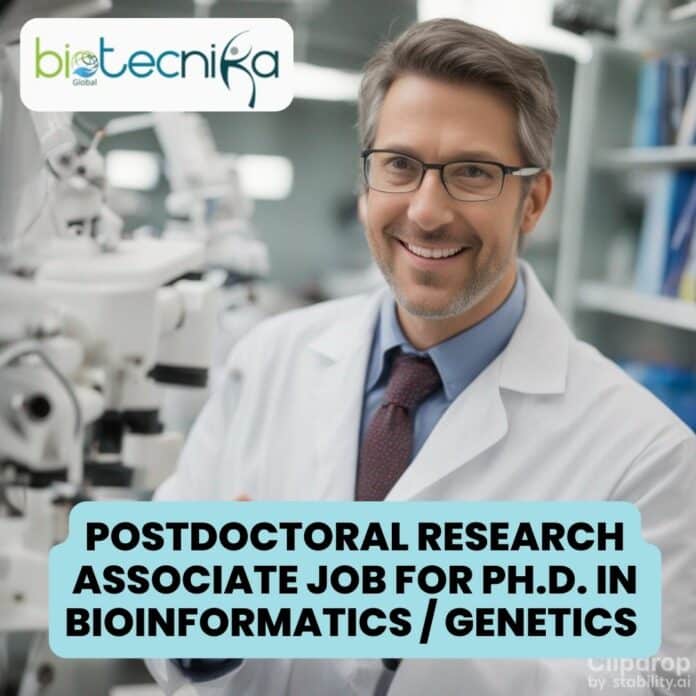University of Virginia is Hiring Ph.D. in Bioinformatics / Genetics
University of Virginia is Hiring Ph.D. in Bioinformatics / Genetics for Postdoctoral Research Associate Job. Interested Candidates can check out the details below and Apply Online.
Job title: Postdoctoral Research Associate
Job Location: Charlottesville, VA
Job id: R0052166
Job Type: Full Time
The Center for Public Health Genomics at the University of Virginia is seeking to fill a Postdoctoral Research Associate position focused on statistical analysis of high-throughput molecular ‘omics data sets for collaborative projects at the cutting edge of human genetics, genomics, and high-throughput molecular ‘omics research under the supervision of Dr. Ani Manichaikul.
The successful candidate will join a collegial and productive research team focused on the statistical and bioinformatic integration of whole genome sequencing with transcriptomic and proteomic data sets with the goal of identifying novel genes and pathways involved in determining risk of chronic obstructive pulmonary disease, idiopathic pulmonary fibrosis and related traits in large multi-center human cohort and case-control studies. Analytical responsibilities will include analysis of bulk and single-cell transcriptomic data sets, genetic association analysis of common and rare disease variants and integrative systems genetics analysis of multi-omics data.
Necessary qualifications include a Ph.D. or related degree in Biostatistics, Bioinformatics, Genetics, Epidemiology, or a related field in hand by start date; knowledge of statistics and genetics; experience with statistical software (R or Python); a strong work ethic; the ability to work independently combined with interest in developing new skill sets through postdoctoral training; willingness to work in a highly interactive and collegial group; and excellent written and oral communication skills. Desired qualifications include experience working with large-scale multi-center studies; working knowledge of existing tools for genetic analysis and data management; C, C++ programming skills; and experience working in a Unix / Linux environment.
This is a 12-month appointment with the possibility of renewal contingent upon satisfactory performance and the availability of funding.
This position will remain open till filled. The University will perform background checks on all new hires prior to employment. A completed pre-employment health screen is required for this position prior to employment.
To Apply:
Internal applicants must apply through their UVA Workday profile by searching ‘Find Jobs’.
Please apply through Workday, and search for R0052166.
Complete an application online with the following documents:
- CV
- Cover letter
- Contact information for 3 references
Upload all materials into the resume submission field, multiple documents can be submitted into this one field. Alternatively, merge all documents into one PDF for submission. Applications that do not contain all required documents will not receive full consideration.
University of Virginia is Hiring Ph.D. in Bioinformatics / Genetics. Here are five Possible interview questions along with possible answers for Postdoctoral Research Associate Job:
1. Question: Can you describe your experience with statistical analysis of high-throughput molecular ‘omics data sets, particularly in the context of human genetics and genomics research?
Answer: During my doctoral research, I extensively worked on the statistical analysis of high-throughput molecular ‘omics data sets, including whole genome sequencing, transcriptomics, and proteomics data. I have experience in identifying genes and pathways associated with complex traits like chronic obstructive pulmonary disease and idiopathic pulmonary fibrosis. My work involved data integration, genetic association analysis, and systems genetics analysis.
2. Question: How have you demonstrated your ability to work collaboratively in a research team, especially when dealing with multi-center human cohort and case-control studies?
Answer: Collaboration is essential in research, and I’ve had the privilege of working in a collaborative research environment during my previous roles. I actively participated in multi-center studies, contributed to study design, and coordinated data sharing among different centers. I believe in open communication and the value of diverse perspectives to drive research forward effectively.
3. Question: Could you provide an example of a challenging data analysis project you’ve worked on, and how did you overcome any obstacles you encountered?
Answer: One challenging project I worked on involved integrating diverse ‘omics data types to uncover genetic determinants of a complex disease. We faced issues related to data quality, missing data, and the complexity of analysis. To overcome these challenges, I collaborated closely with experts in the field, applied rigorous quality control measures, and developed innovative analytical approaches, which ultimately led to meaningful discoveries.
4. Question: How do you stay updated with the latest advancements in statistical and bioinformatic tools for genetic analysis, and how do you incorporate new techniques into your research?
Answer: Staying current in this rapidly evolving field is crucial. I regularly follow scientific literature, attend conferences, and engage with online communities to keep up-to-date with the latest tools and methodologies. When I come across new techniques that could benefit my research, I take the initiative to learn and implement them, ensuring that our analyses are as robust and informative as possible.
5. Question: This position requires strong written and oral communication skills. Can you provide examples of your experience in effectively communicating complex research findings to both technical and non-technical audiences?
Answer: Communication is a fundamental aspect of scientific research. In my previous roles, I’ve presented my research findings at conferences, published papers in peer-reviewed journals, and effectively communicated complex statistical results to both scientific and non-scientific stakeholders. I believe in using clear and concise language, visual aids when necessary, and adapting my communication style to suit the audience, whether it’s a technical team meeting or a presentation to a broader audience.
Editor’s Note: Bayer Hiring BSc Life Sciences & PhD Candidates For Medical Science Liasion . Please ensure you are subscribed to the Biotecnika Times Newsletter and our YouTube channel to be notified of the latest industry news. Follow us on social media like Twitter, Telegram, Facebook and Instagram.



